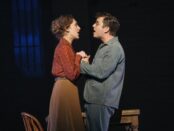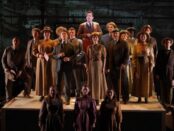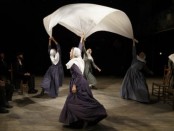Parade
While Brown's tunefully varied score strives to historically situate the bigoted nightmare we're witnessing within the cultural context of the South's fabricated sense of nobility and victimhood, an offensive postbellum myth known as The Lost Cause, Alfred Uhry's reductive book ham-fistedly narrows our attention, transitioning from a corrupt law-and-order procedural in the first act to a preposterously scripted search for the truth after the intermission. Although Dane Laffrey's unremarkably fungible from-courthouse-to-prison-to-gallows set overbrims with historical figures, most of them exist on a character believability spectrum somewhere between "My Cousin Vinny" and "Driving Miss Daisy" (also written by Uhry). If not for Sven Ortel's rear-wall historical projections of these real people, an audience might suspect at least a few of them were invented out of whole cloth. [more]



